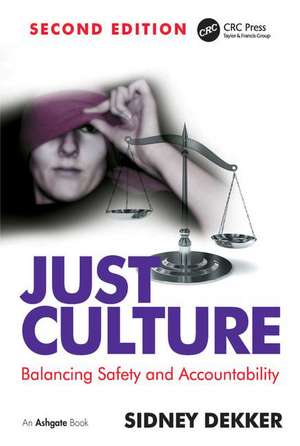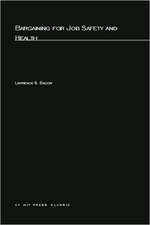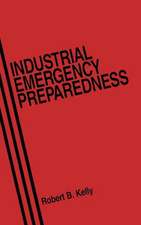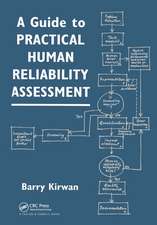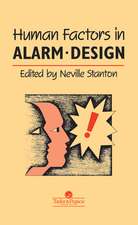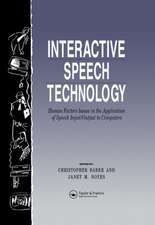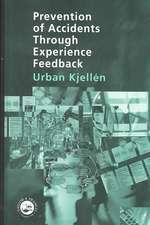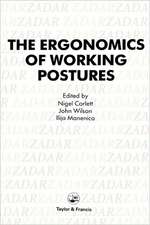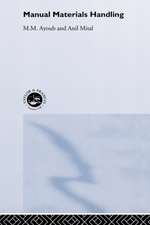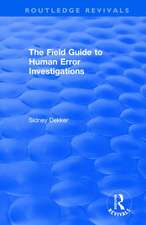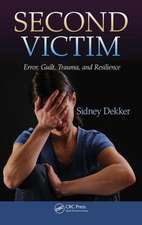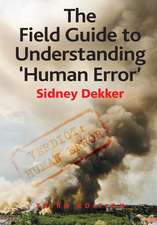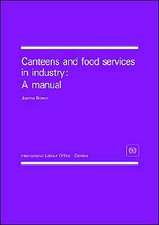Just Culture: Balancing Safety and Accountability
Autor Sidney Dekkeren Limba Engleză Paperback – 22 iun 2012
| Toate formatele și edițiile | Preț | Express |
|---|---|---|
| Paperback (2) | 362.36 lei 3-5 săpt. | +16.04 lei 7-13 zile |
| CRC Press – 24 oct 2016 | 362.36 lei 3-5 săpt. | +16.04 lei 7-13 zile |
| CRC Press – 22 iun 2012 | 369.99 lei 3-5 săpt. | +16.39 lei 7-13 zile |
Preț: 369.99 lei
Nou
Puncte Express: 555
Preț estimativ în valută:
70.80€ • 73.92$ • 58.59£
70.80€ • 73.92$ • 58.59£
Carte disponibilă
Livrare economică 15-29 martie
Livrare express 01-07 martie pentru 26.38 lei
Preluare comenzi: 021 569.72.76
Specificații
ISBN-13: 9781409440604
ISBN-10: 1409440605
Pagini: 200
Ilustrații: Includes 1 b&w illustration
Dimensiuni: 153 x 219 x 13 mm
Greutate: 0.29 kg
Ediția:2 ed
Editura: CRC Press
Colecția CRC Press
ISBN-10: 1409440605
Pagini: 200
Ilustrații: Includes 1 b&w illustration
Dimensiuni: 153 x 219 x 13 mm
Greutate: 0.29 kg
Ediția:2 ed
Editura: CRC Press
Colecția CRC Press
Public țintă
Academic and Professional Practice & DevelopmentCuprins
Contents: Preface; Prologue: a nurse's error became a crime; What is the right thing to do?; 'You have nothing to fear if you've done nothing wrong'; Between culpable and blameless; Are all mistakes equal?; Report, disclose, protect, learn; A just culture in your organization; The criminalization of human error; Is criminalization bad for safety?; Without prosecutors there would be no crime; Three questions for your just culture; Why do we blame?; Epilogue; Index.
Notă biografică
Sidney Dekker is Professor of Humanities at Griffith University in Brisbane, Australia. Educated as a psychologist in the Netherlands, he gained his Ph.D. in Cognitive Systems Engineering from The Ohio State University, USA. He has lived and worked in Sweden, England, Singapore, New Zealand, and the Netherlands. The author of several best-selling books on system failure and human error, Sidney has been flying the Boeing 737NG part-time as an airline pilot.
Recenzii
’Readers interested in organizational ethics and decision-making will benefit from the case studies and examples. Summing Up: Recommended. Lower- and upper-level undergraduates; general readers.’ Choice, February 2013 ’...it is difficult to think of a more relevant and challenging book for health and safety practitioners, company managers and directors, regulators of all stripes, and members of parliament.’ Safeguard, New Zealand, Jan/Feb 2013 Comments on the First edition (2007): 'Sidney Dekker's book is a thought-provoking exposition of the concept of a just society. Would that we could achieve it! The questions that the author raises need to be discussed at all levels of government, and by judges and lawyers, and by ministers of health. Dekker makes it clear that profound changes must be made in both the legal and the medical systems if we really wish to improve medical safety.' John W. Senders, University of Toronto, Canada 'A timely book about the current major safety dilemma - how do we resolve the apparent conflict between increasing demands for accountability and the creation of an open and reporting organisational culture? Thought-provoking, erudite, and analytical, but very readable, Sidney Dekker uses many practical examples from diverse safety-critical domains and provides a framework for managing this issue. A 'must-read' for anyone interested in safety improvement, but also, one hopes, for politicians, law-makers and the judiciary.' Dr Tom Hugh. MDA National Insurance Ltd, Sydney, Australia 'With surgical precision Sidney Dekker lays bare the core elements of a just culture. He convincingly explains how this desired outcome arises from a combination of accountability and (organisational) learning. The real-life cases in the book serve to drive his arguments home in a way that will be easily recognised and understood by practitioners in safety-critical industries, and hopefully also by rule makers and lawyers.' Bert Ruitenberg, IFATCA Hum
Descriere
While many organizations see the value of creating a just culture they struggle when it comes to developing it. In this Second Edition, Dekker expands his views, additionally tackling the key issue of how justice is created inside organizations. Dekker also introduces new material on ethics and on caring for the’ second victim’ (the professional at the centre of the incident). Consequently, we have a natural evolution of the author’s ideas.
